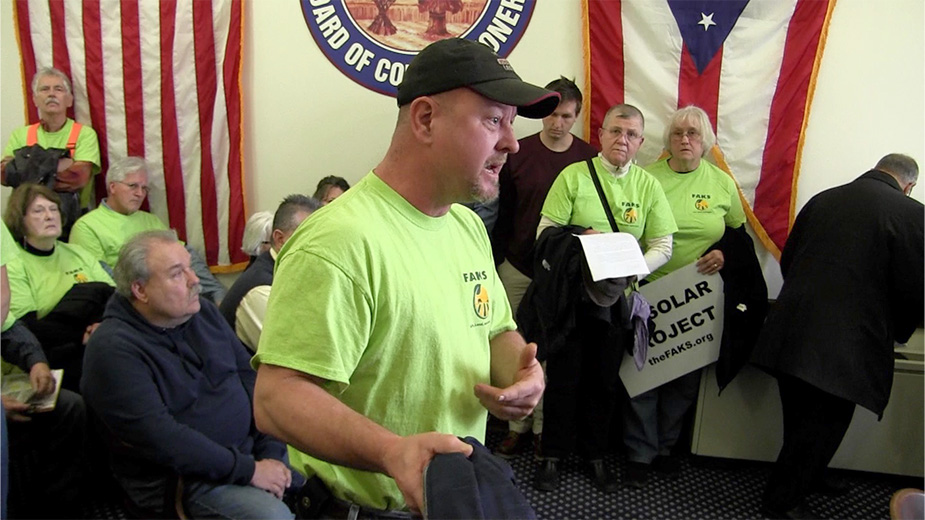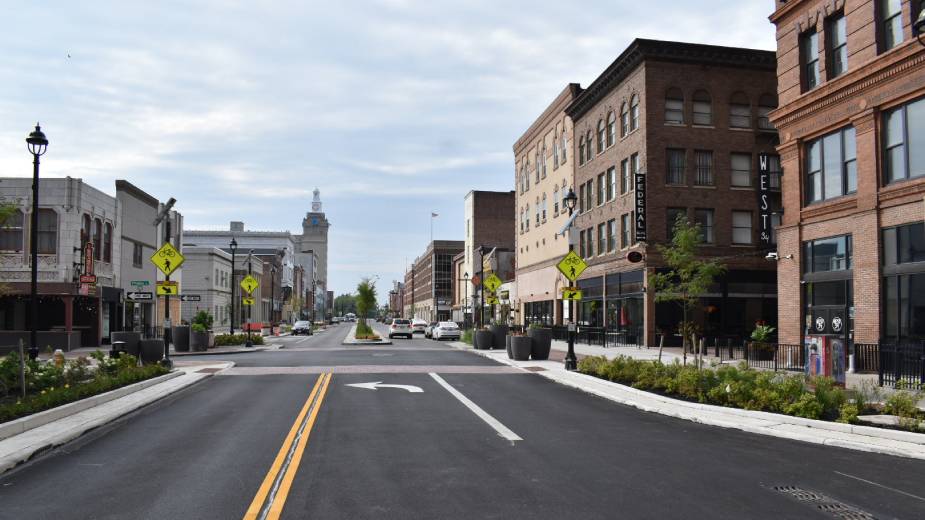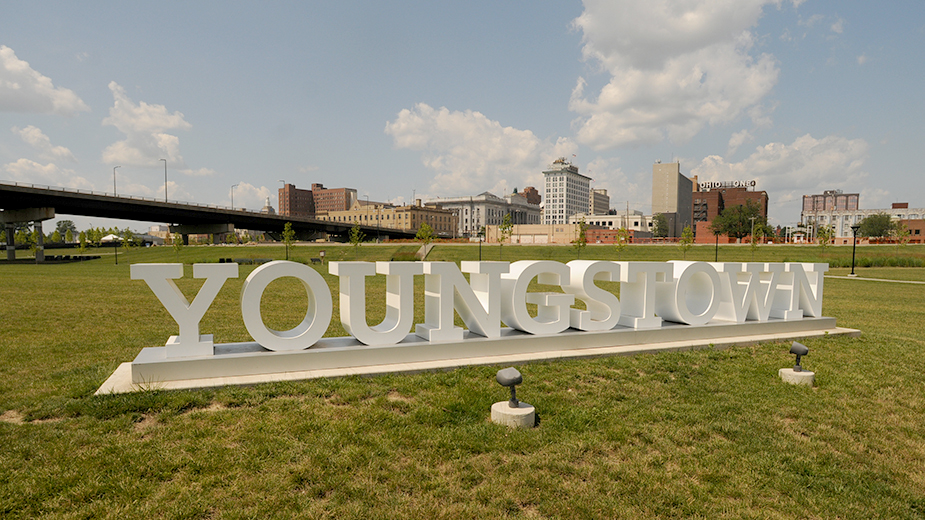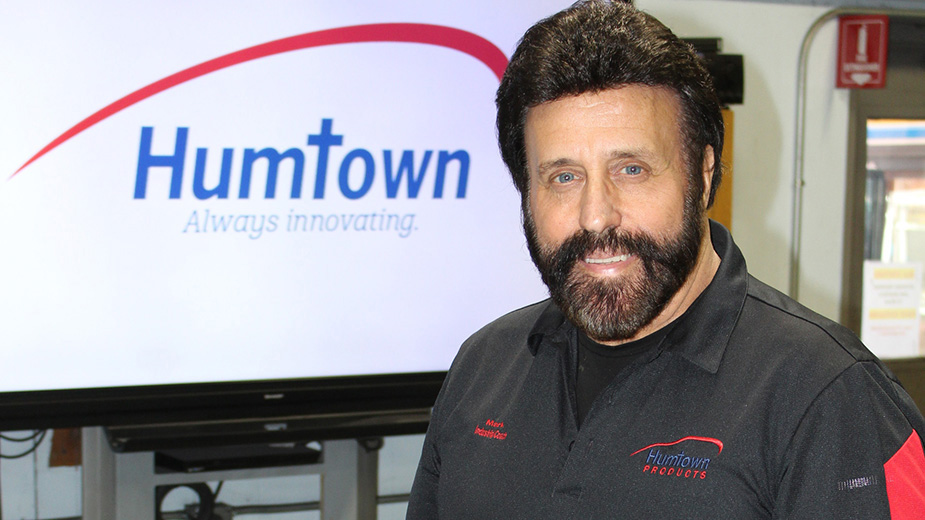Residents Weigh In on Both Sides of Solar Issue
LISBON, Ohio – With the Kensington Solar Project pending in Summitville, four Columbiana County townships asked county commissioners to ban large solar and wind farms in their areas.
At this point, the only proposed project in Columbiana County is in Franklin Township, where 2,264 acres owned by four property owners are listed as a part of the project proposed by Liberty Power, a subsidiary of Algonquin Power of Oakville, Ontario, Canada.
Those for and against the project from Franklin Township were the most vocal who attended a public hearing Wednesday morning.
Commissioners took no action following the hearing, giving people until Feb. 24 to submit any additional written testimony they want considered. However, two of the commissioners passed a resolution last year voicing their concerns about the slated solar project taking away from agricultural and forested land, as well as inhibiting the future expansion of Summitville.
Those in Favor of the Solar Project
Jed Coldwell, a Hull Road resident, said he has 17 acres leased to the Kensington Solar Project. To him, it is a matter of private property rights and he is against any proposed ban that would restrict the lawful use of his land. He does not believe his use of his land for the production of solar power encroaches on the rights of his neighbors.
Likewise, David Coldwell, another Hull Road resident, said private property owner rights trump everything else, and the banning of such projects interferes with those rights. He rhetorically asked that if the company addresses all their concerns about any potential harm of such a project, would they let it go through or is it just that they do not want it because of how it will look.
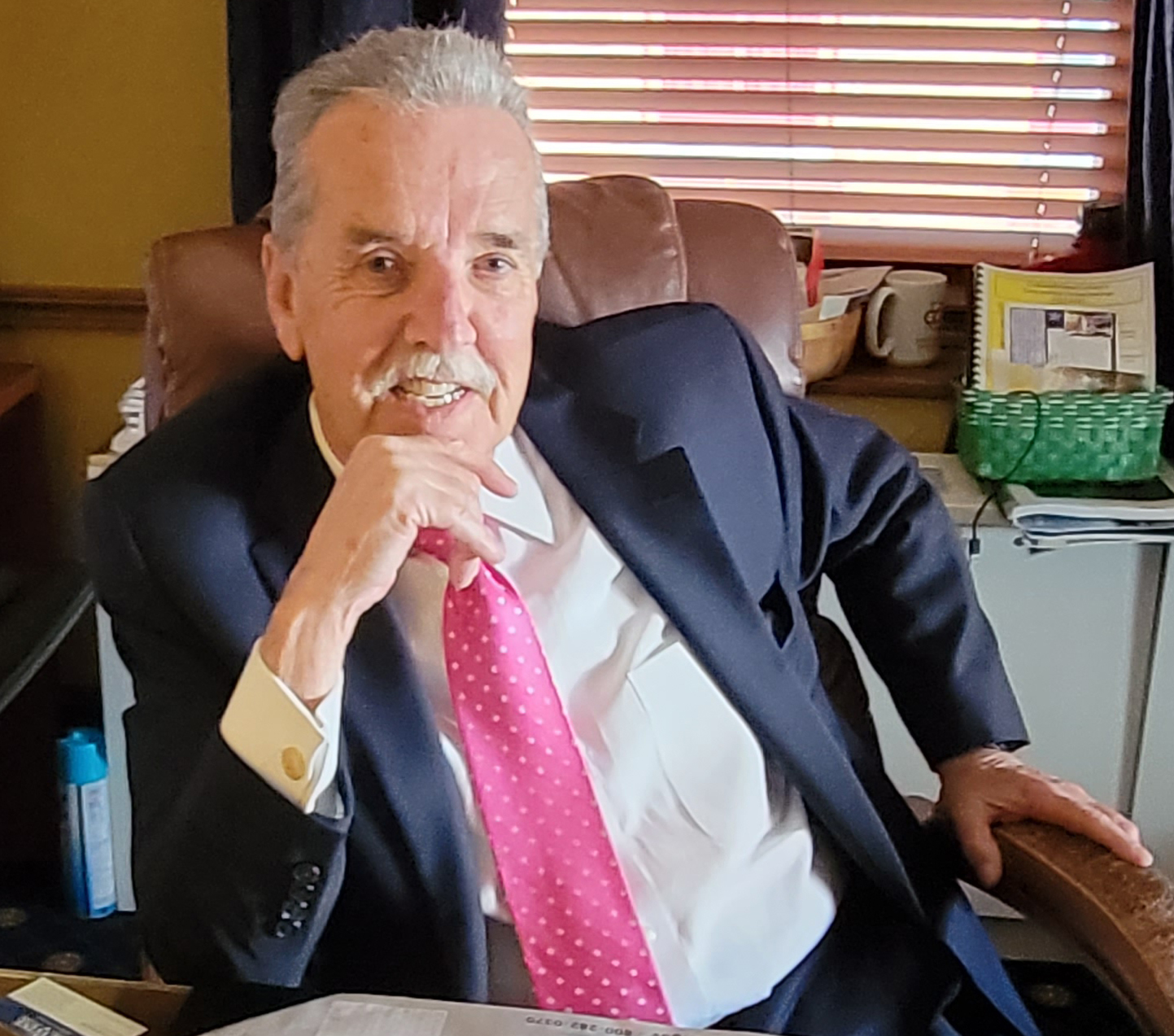
Duane Prusia of Stillwaters Farm on Five Forks Road said he believes limiting township residents from using their farmland for solar violates their rights as property owners. He believes an acre of solar panels generates much more in taxes and creates much more energy than an acre of corn. He argued the solar farm project will soon be the largest taxpayer in the Southern Local School District.
“Solar is safe. It’s efficient. It’s the cheapest form of electricity,” Prusia said. “It’s cheaper than coal. It’s cheaper than natural gas. It’s cheaper than nuclear.”
He believes that without building these clean energy projects, the area will miss out from consideration on future projects as companies insist on reducing their carbon footprint. Prusia claimed the project would create enough energy to power 100,000 homes. But he was challenged by Commissioner Mike Halleck about whether local residents will get to use this power or it will be sent elsewhere.
Those Against the Solar Project
Diane Brown, a member of the Carroll Electric Co-Op Board, said the electricity provided to the local residents comes from American Electric Power lines, not the Ohio Edison lines this electricity would feed into.
Brown, whose family has farmed in the Summitville area for generations, said only four land owners in the township have agreed to this plan.
Senate Bill 52 now gives agricultural communities the right to protect farmland from large industrial projects. The Kensington Solar Project, if it goes through, would not be affected by the regulations of Senate Bill 52, because it was filed prior to the law going into effect.
“We have the same solar radiation in northeast Ohio as southern Alaska,” Brown said. “If you were a business person, you would not put a solar project here unless there was outside money. There’s up to $50,000 per acre going to go in outside stimulus money into these projects. I, as a farmer, have never been offered $50,000 an acre to farm my land, and that is why this is all skewed.”
Brown is one of the co-founders of the group Franklin Against Kensington Solar, which has more than 400 people involved who have signed petitions, sent testimony to the Power Citing Board and attended meetings. The township has 780 residents, including children.
So far, no date has been set for the hearing for the Kensington Solar Project because Brown said the company has not yet paid the $67,500 application fee, which was due about five months ago.
“We don’t really know why, other than maybe they’re getting the idea that this isn’t a good idea,” Brown said.
Henry Bergfeld, who once managed the angus operations of Summitcrest Farms, said if the village is surrounded by solar panels, it would become a ghost town. American Farmland Trust, Bergfeld said, predicts by 2040 Ohio will lose more farmland than any state in the Midwest, leading to a loss of income, jobs and future increases in the price of food.
“We need to be forward thinking about our long-term use of land,” Bergfeld said. “Yes, I believe that solar can have an advantage, but put them on roofs in the big cities where the power is going to be used, not out here in the country where we’re going to live and then have the power shipped there and we get individually no added benefit.”
Robert Powell, a Fink Road resident, voiced his belief that technology is not there to create enough electricity to justify destroying farmland and possibly poisoning livestock by chemicals leaking from the solar panels.
Genie Gromley, an Emerick Road resident, approached commissioners with her concerns about wildlife in the area, the consumption of crops when deer have fewer places to go and decreases in property values.
Additionally, Gromley challenged that the loss of trees will be detrimental to the environment in the township.
Peg Speirs, the wife of another multigenerational property owner from the township, talked a lot about why residents chose to settle in the area near Summitville.
“Two central features of our local community are family and aesthetics,” Speirs said, adding many families are historically tied to their farms. She and her husband plan to use their farmland to build a new home and create a residency program for writers and artists.
“We want to preserve the land of Franklin Township, the foothills of the Appalachians, the oldest mountain range in North America with rolling hills and lush, green valleys so future generations don’t inherit an industrial wasteland,” Speirs said.
David Johnson of Summitville Tile said his grandfather established the village of Summitville and gave away free land and free brick to people who moved to the town. Johnson is involved in a lawsuit regarding the proposed project and how it would infringe on mining operations for the tile company.
“I’m opposed to it all over Columbiana County,” Johnson said. “I have seen these sites before where you have thousands of acres of unsightly panels that leak and leach. Most of the panels are made in China. The company that wants to bring the project into Franklin Township is from Canada. What do we owe them?”
Johnson said that the Franklin Township trustees, as well as legislators onthe state and national level, have come out against the proposed project there.
“It’s a monstrous industrial-sized project that would ruin the aesthetics of this beautiful, small, little community that my family played an important part in establishing,” Johnson said.
Other Townships Urge Preemptive Actions
Trustees from Fairfield, Perry and West Townships appeared to make a preemptive request without any solar or wind projects currently known as planned in their townships.
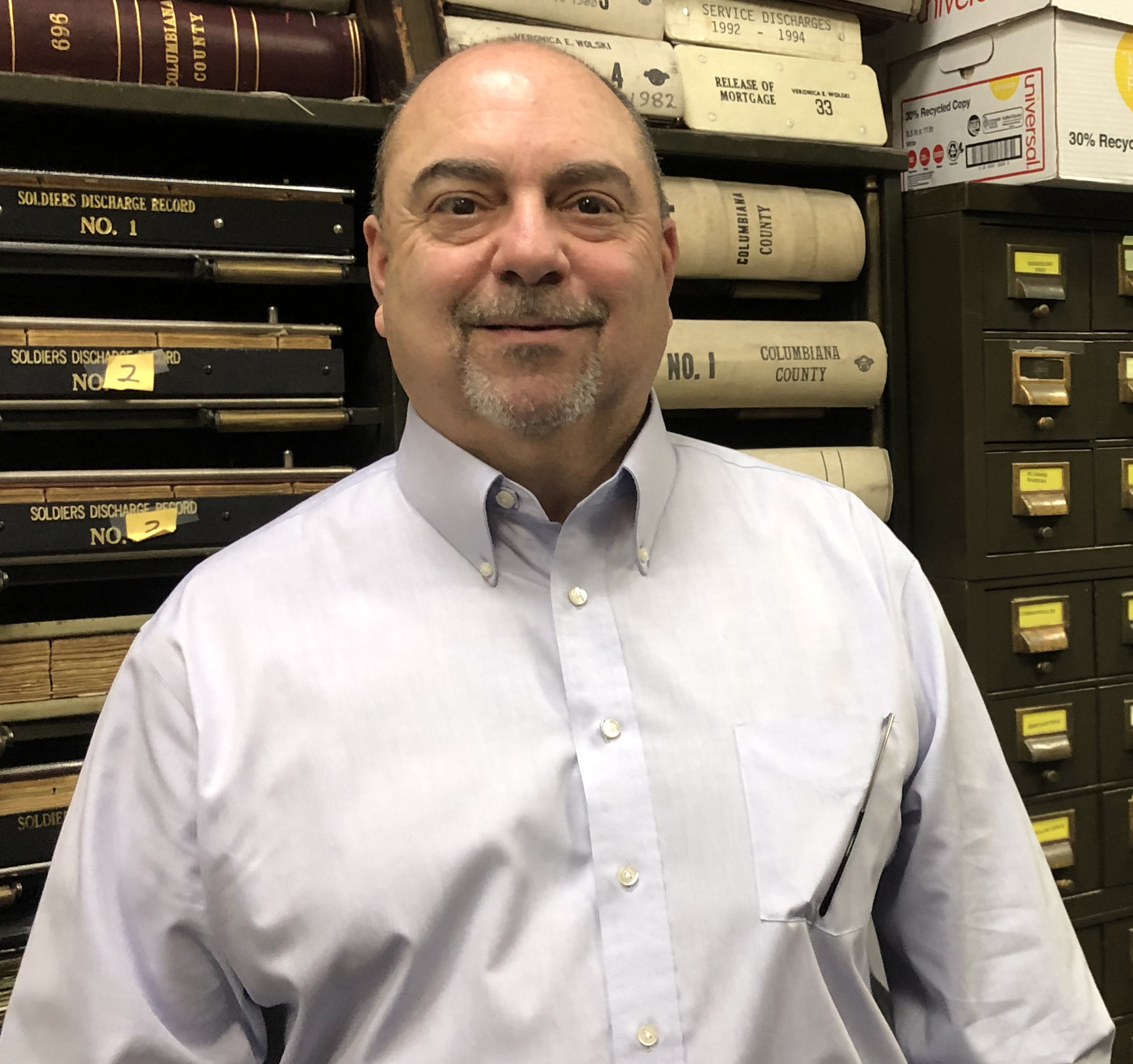
Fairfield Township Trustee Bob Hum, West Township Trustee Dale Lowmiller and Perry Township Trustee James Armeni all spoke on their boards’ decisions to pass resolutions in an attempt to preserve the way of life in residential and agricultural townships.
“We want to remain a farming community. We’re against removing acreage from producing corn, soybeans and wheat,” Hum said.
Developer Chuck Beiling of Fairfield Township said he is against these projects because residents who spend money for good housing should not be forced to blend that in with unsightly wind and solar fields.
“I really believe it’s a political thing, Beiling said. “I think something to jam down our throats by a certain party that is way ahead of themselves and needs to be reigned in.”
In a response to a request by Charles Crissman, a West Township resident, about the definition of a large solar or wind farm project, Commissioner Tim Weigle said 50 mega-watt or smaller does not have to go before the Ohio Power Siting Board. Crissman said, in his estimation, 25 acres would not be too large, but 2,200 acres are too much.
Following the meeting, Halleck said commissioners are also hearing opposition from at least four or five additional townships. He can see the issue from both sides, with his conservative leanings agreeing people should be able to do what they want to do with their own property. But he also believes that does not give people the right to ruin the property of others, especially farms that have been in families for generations.
“Regardless of our personal feelings, we are elected by a majority of people, and I have felt an obligation to be their spokesperson and honor their wishes,” Halleck said.
Pictured at top: Robert Powell, a member of Franklin Against Kensington Solar, speaks about his concerns during a hearing Wednesday before the Columbiana County commissioners.
Copyright 2024 The Business Journal, Youngstown, Ohio.
